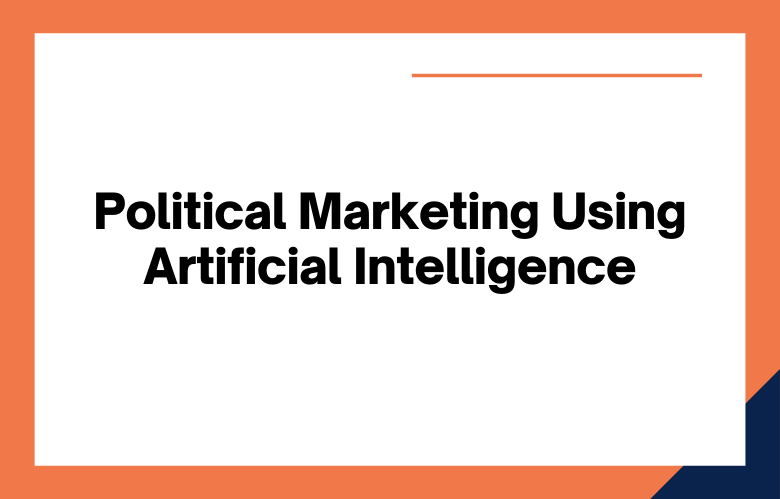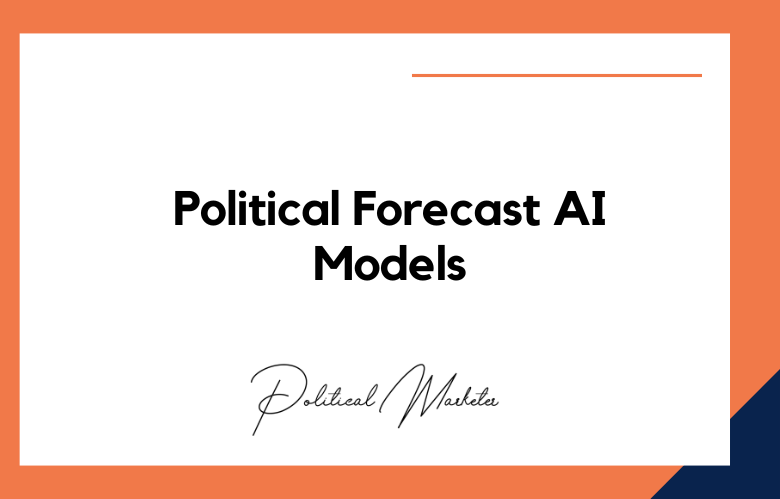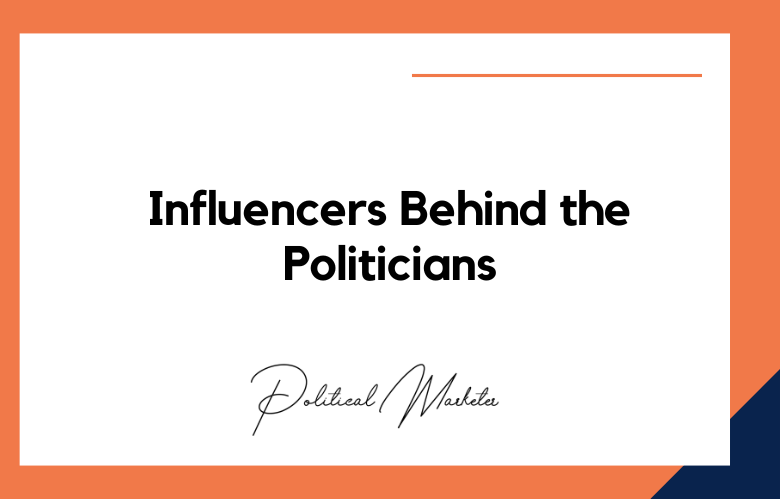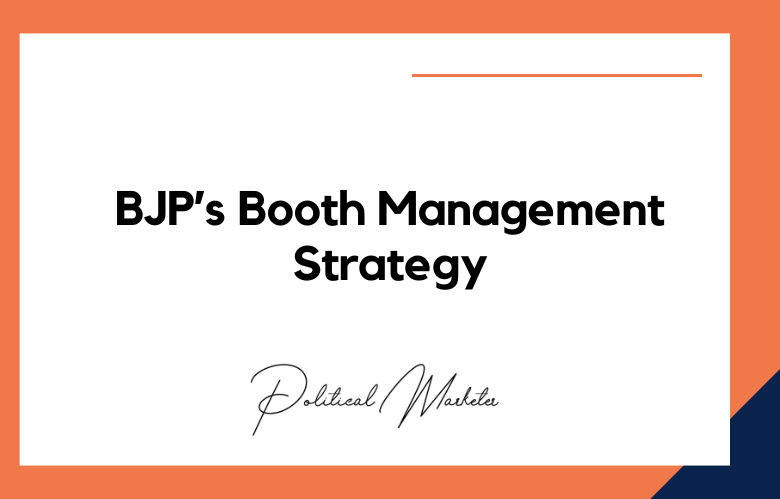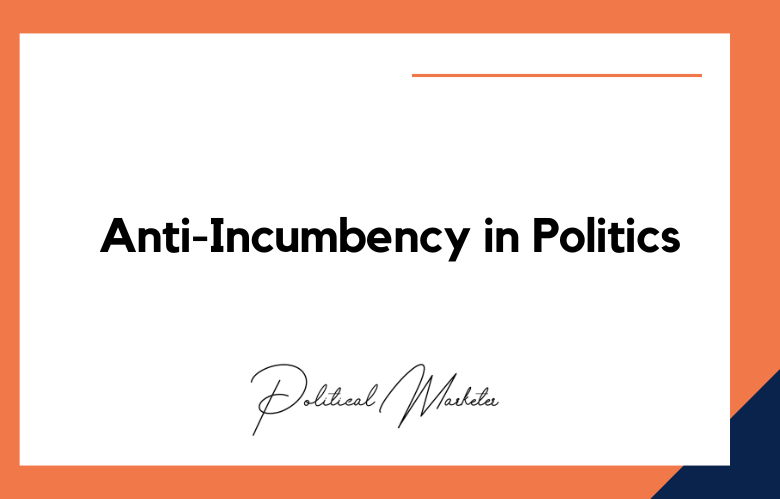Politicians are now looking at Artificial Intelligence to reach new voters. They see AI software as a potential tool in their campaign arsenal and maybe take advantage of AI for political marketing.
Politicians have been using data analytics for years, but the current trend is that they see the benefits of reaching out to potential constituents by utilizing artificial intelligence. A study from Stanford University found that “AI can do a better job than humans when it comes to finding people’s persuasive arguments on social media posts.”
Politicians will use this data analysis technology to find undecided voters’ most persuasive arguments and then send targeted ads with those messages.
Artificial intelligence is the most used political sphere. Campaigns use AI to target voters, create ads, and predict election outcomes.
Political marketing teams have begun hiring data scientists specializing in machine learning to help them mine voter-generated information for insights that will help their candidates win elections.
As a result, campaign managers can now make more intelligent decisions about where they spend their time and money – knowing how individual voters feel about particular issues is vital for crafting persuasive messages that resonate with the right people.
This strategy is effective because it’s based on facts rather than conjecture or guesswork, which means campaigns are always up-to-date with the latest research trends and changes in public opinion over time.
How Artificial Intelligence is being used in political marketing
A recent study by the Columbia Journalism Review found that political campaigns use Artificial Intelligence to craft more effective digital advertisements.
Artificial Intelligence has become a widely used concept in marketing and is especially popular because of its ability to create a practical customer experience.
One of the ways companies are using Artificial Intelligence is in political marketing. Because AI can process large amounts of data, it can predict election results based on past voter turnout and demographic information.
Artificial Intelligence has been used in marketing for quite some time now. The use of AI-enabled marketers to better understand their customers and create more personalized messages that resonate with them. Political parties are also using Artificial Intelligence to understand voting behavior.
Political marketing has always been about understanding the electorate and tailoring the right message to the right people at the right time. This process is becoming increasingly sophisticated as artificial intelligence (AI) is increasingly used to gather data and target voters with personalized messages.
Using algorithms, AI can sift through vast amounts of data to identify patterns and trends that would otherwise be undetectable. This information can then micro-target individual voters with highly personalized messages that appeal to their interests and concerns. In this way, AI gives political campaigns a powerful tool for understanding and influencing voters.
Of course, AI is not without its risks. There is a danger that artificial intelligence could be used to manipulate public opinion by spreading false or misleading information. However, if used responsibly, AI could help to make political marketing more effective and democratic.
Political marketing has always been complex and dynamic, requiring campaigns to be savvier and more strategic than ever. With the advent of artificial intelligence, political marketers now have access to a powerful new tool that can help them target voters more effectively and efficiently.
AI can predict voting patterns, identify potential swing voters, and track the real-time impact of campaign messages. In addition, AI can help campaigns better understand and respond to the issues that matter most to voters. As Political Marketing using AI continues to evolve, it will become an increasingly important part of any successful political campaign.
Political marketing has always been about understanding and targeting voters. And with the advent of artificial intelligence, this process is only becoming more sophisticated. AI can help identify patterns in voting behavior and analyze vast amounts of data to target specific groups of voters with personalized messages.
In addition, AI can track the impact of campaigns in real-time and adjust strategies accordingly. As a result, political parties and candidates are increasingly turning to AI to give them an edge in the highly competitive world of political marketing.
Political marketing has always been about using data to identify potential voters and crafting a message that resonates with them. However, the scale and complexity of data have increased exponentially in recent years, making it impossible for humans to process and analyze all of the information on their own.
As a result, more and more political campaigns are turning to artificial intelligence (AI) for help. AI can quickly sift through large data sets to identify patterns and trends that would be difficult for humans to see.
This information can tailor messages to specific voter groups and precisely target them. In an era where big data is becoming increasingly important, AI is emerging as a powerful tool for political campaigns.
What is the future of AI in Political Marketing?
Artificial intelligence is developing rapidly and seems poised to improve our lives. It has dramatically impacted medicine, manufacturing, transportation, finance, defense, and more.
Artificial intelligence can be dehumanizing. It’s essential to ensure it doesn’t replace human empathy or that we don’t use it in ways that exploit people.
One of the top exciting developments in political science is the possibility that artificial intelligence will predict future events, such as elections.
We’re entering an age where AI will be everywhere, and many people are worried about the implications. Some think we’ll have to start making laws against it, while others believe that’s unnecessary.
New technologies, particularly AI, have transformed political marketing in recent years. AI gives political marketers powerful tools for segmenting and targeting voters, developing sophisticated messaging, and optimizing campaign strategies.
In the future, AI will likely play an even more critical role in political marketing as campaigners increasingly rely on data-driven insights to guide their decision-making. As AI technology continues to evolve, it will become even more effective at helping political marketers to win elections.
Political marketing has always been about understanding and targeting voters. In the past, this meant using data like voting history, census information, and surveys to identify potential supporters and understand what issues mattered to them. However, with the advent of artificial intelligence (AI), political marketers now have access to far more sophisticated tools.
AI can process vast amounts of data much more quickly than humans, allowing for a more detailed and nuanced understanding of voter preferences.
AI can be used to develop targeted messaging customized to the individual voter. Political campaigns are already beginning to use AI to track voter behavior and target ads, and this trend will likely continue to grow. AI will play an increasingly important role in political marketing as it becomes more sophisticated.
Political marketing has always been about understanding and appealing to the electorate. In recent years, big data and sophisticated analytics have allowed campaigns to target voters with unprecedented precision. However, the next frontier in political marketing is AI.
Political campaigns already use AI to process data and identify key voting demographics. In addition, AI-powered chatbots are used to engage voters and collect feedback.
As AI technology evolves, it will become an increasingly powerful tool for political campaigns. With its ability to quickly process large amounts of data and identify patterns, AI will allow campaigns to target voters with even greater precision. In addition, AI chatbots will become more sophisticated and realistic, making them even more effective at engaging with voters. As Political Marketing evolves, AI will play an increasingly important role.
In recent years, political campaigns have increasingly relied on data and technology to target voters effectively.
This trend will only continue in future elections as campaigns become more sophisticated in using data. Artificial intelligence (AI) is one area that is likely to play an increasingly important role in political marketing.
AI can process large amounts of data more quickly and accurately than humans, helping campaigns identify trends and predict voter behavior.
AI can create personalized messages and ads more likely to resonate with voters. As AI becomes more sophisticated, it will likely play an essential role in helping political campaigns to understand better and reach voters.
How to use AI as a Political campaign tool
Artificial intelligence is a potent tool that can be used to help with a political campaign. It’s used to predict how the public will vote on initiatives and assist in decision-making for candidates.
Artificial Intelligence can make better adverts, increase candidates’ chances of success, and draw more voters.
Artificial Intelligence can be used in all aspects of political campaigning. For instance, it could be programmed to poll voters on what issues are important to them and subsequently focus the campaign’s messaging around those topics.
Political campaigns have increasingly relied on data-driven strategies in recent years, and AI plays an increasingly important role. By harnessing the power of big data, AI can help campaign teams to target voters more effectively, personalize messages, and predict election outcomes.
In addition, AI can automate repetitive tasks such as voter outreach and fundraising. As the use of AI in political campaigns continues to grow, it will become increasingly essential for campaign teams to learn how to use it effectively.
With its ability to provide insights into voter behavior and election dynamics, AI has the potential to revolutionize the way campaigns are run.
Political campaigns have always been about marketing. Candidates use television ads, social media, and personal appearances to reach voters and persuade them to support their candidacy.
However, traditional marketing techniques are no longer enough to win elections. In today’s politically charged environment, candidates must find new ways to connect with voters and stand out. One way to do this is by using AI-powered political marketing tools.
AI can help candidates identify and target their most essential voters with personalized messages.
It can also monitor and respond to online conversations in real-time, allowing campaigns to quickly address negative media coverage or engage in digital debates with opponents. By harnessing the power of AI, political campaigns can gain a significant advantage in the race for office.
Political campaigns have become more data-driven in recent years, using sophisticated tools to target potential voters and track the effectiveness of their outreach efforts. With the advent of artificial intelligence (AI), campaign strategists have access to even more powerful tools for targeting and persuasion.
AI can be used to identify voters likely to be swayed by a particular message and can also be used to customize that message for maximum impact. In addition, AI can monitor social media for early signs of shifting public opinion, allowing campaigns to adjust their strategies in response quickly.
As AI evolves, we will likely see even more innovative uses in the political sphere.
Political parties and candidates are turning to AI to help reach out to voters and understand their preferences.
By harnessing the power of big data, AI can provide valuable insights into the electorate. Political campaigns can use these insights to develop targeted messages and tailor their outreach efforts.
In addition, AI can be used to identify potential donors and volunteers. Using AI, political campaigns can gain a significant advantage in efficiency and effectiveness. AI will likely play an increasingly important role in political campaigning in the coming years.
How is AI being used in Political Marketing?
Political campaigns have always been at the forefront of cutting-edge marketing techniques to reach voters. Recently, they have started embracing artificial intelligence (AI) to target and win voters effectively.
One of the most common ways AI is used in political marketing is through “microtargeting.” This involves using data gathered about individual voters to customize Political ads and messages specifically for them. This can be incredibly effective, as it allows campaigns to give each voter the impression that they are speaking directly to them.
AI is also being used to predict which issues will likely be necessary for future elections and how best to address them. By analyzing vast amounts of data, AI can help campaigns to identify trends and issues that might otherwise be missed. This information can then be used to shape campaign strategy and messaging.
Overall, AI is becoming increasingly important in political marketing. By helping campaigns target individual voters more effectively and understand which issues are likely necessary, AI plays a vital role in assisting candidates in winning elections.
Political marketers are turning to AI to target potential voters more. Using data from social media and other sources, AI can help identify critical issues and demographics important to voters. In addition, AI can be used to track potential voters’ online activity to understand their interests better.
Political marketers can then use this information to tailor their messages and ads to appeal to these voters. Additionally, AI can automate tasks such as emailing and permission-based SMS marketing.
This allows political campaigns to free up staff time to focus on other tasks. AI provides political marketers with new tools to help them reach and persuade potential voters more effectively.
Political marketers use AI to understand voters better and target them with ads. They use data gathered from social media, surveys, and other sources to create models of voters that predict their behavior. This information is then used to target ads and messages to specific voters.
Political marketers believe that AI provides a more accurate way to target voters than traditional methods such as polling. In addition, AI can help Political marketers better understand the issues that voters care about and craft messages that appeal to them. Political marketing is becoming increasingly data-driven, and AI plays an essential role.
Political Marketing has always been about understanding the electorate and delivering content that appeals to them. With the rise of big data and AI, we can now do this on a much larger scale and with greater precision. Political marketers can now use AI to track what content resonates with voters and adjust their strategy accordingly.
AI can also target ads more effectively, ensuring they reach the right people at the right time. In addition, AI can help to analyze vast amounts of data to identify trends and patterns that would be otherwise invisible. By harnessing the power of AI, political marketers can gain a much deeper understanding of the electorate and deliver more effective campaigns.
How AI works on the political campaigns
Political campaigns have been using AI for quite some time now. They use it for things like voter targeting and message testing. In the past, they’ve also used it to automate tasks like fundraising. Political campaigns are always looking for new ways to use AI. For example, they are now using it to target potential voters with ads on social media.
They also use it to track and respond to news in real-time. Political campaigns will continue to use AI in new and innovative ways as technology evolves.
Political campaigns have always been highly competitive and are only getting more so.
To win, campaigns need to be able to reach as many potential voters as possible and persuade them to support their candidate. Political marketing using AI can help campaigns to do both of these things. AI can be used to identify potential voters who are most likely to be persuaded by the campaign’s message. It can also be used to customize that message for each individual, making it more likely to resonate. Using AI, campaigns can ensure their messages get through to the people who matter most.
Political campaigns have increasingly relied on data and analytics in recent years, and artificial intelligence (AI) plays an increasingly important role.
By harnessing the power of big data, AI can help campaigns streamline their messaging, target swing voters more effectively, and predict the behavior of voters with greater accuracy. In addition, AI can automate repetitive tasks such as fundraising and canvassing, freeing campaign staff to focus on other priorities.
As the use of AI in political campaigning continues to grow, it is likely to impact the outcome of elections significantly.
Political campaigns have always been data-driven endeavors, relying on information about voter demographics and preferences to craft winning strategies. In recent years, however, the application of artificial intelligence (AI) has taken campaign data analysis to a whole new level.
Political consultants now use AI-powered software to predict how individual voters behave and how entire populations respond to various messages and tactics. The same technology is used to automatically generate targeted ads and optimize ad delivery times for maximum impact.
In the hands of skilled experts, AI has become a powerful tool for shaping public opinion and winning elections.
What are the challenges of AI in Political Marketing?
Political marketing has always been about understanding and appealing to voters. In the past, this was primarily done through polling and focus groups. However, with the advent of big data and artificial intelligence, there are new opportunities for political marketers to target and personalize their messages.
However, some challenges come with using AI in political marketing. First, it cannot be easy to obtain high-quality data sets. Second, there is a risk of over-personalization, which can alienate voters if they feel like they are being targeted too specifically.
AI tools are constantly changing and evolving, making it difficult to keep up with the latest trends. Despite these challenges, AI presents a promising opportunity for political marketers to understand better and reach their target audiences.
Political marketing has been revolutionized by the advent of artificial intelligence (AI). By harnessing the power of big data, AI can provide previously unattainable insights. However, AI is not without its challenges. One of the biggest challenges is data bias.
Political marketers must be careful to ensure that their data sets are representative of the population as a whole. Otherwise, they run the risk of making decisions based on inaccurate information. Another challenge is managing customer expectations.
As AI evolves, customers expect increasingly personalized and responsive service. Political marketers must find ways to meet these expectations without sacrificing privacy or security. Finally, political marketers must stay up-to-date with AI developments to stay ahead of the competition. By understanding the challenges of AI in political marketing, marketers can position themselves to capitalize on its enormous potential.
Political marketing has always been a complex and ever-changing field, but the introduction of AI has brought new challenges. One of the most significant challenges is managing the massive amount of data that is now available.
Political campaigns generate vast amounts of data from voter rolls to social media activity, and AI can help make sense of this data and identify patterns and trends.
However, managing and understanding this data can be daunting, and it is easy to overwhelm campaign staff with too much information. Another challenge is maintaining control over the campaign message. In the past, campaigns could carefully craft their message and release it on their terms.
However, with social media and other online platforms, voters are now bombarded with constant information from all sides.
As a result, it can be difficult for campaigns to cut through the noise and ensure their message is heard.
Finally, there is the risk that AI will automate the same old strategies used in the past. Political campaigns are constantly trying to find new ways to reach voters, but if AI automates old systems, it will entrench existing power structures further.
These are just some of the challenges political marketers face when using AI. As technology continues to evolve, new challenges are sure to arise.
Political marketing has always been essential in winning elections and building policy support.
In recent years, however, the use of AI in political marketing has become increasingly commonplace. While AI can be a powerful tool for tailoring messages and reaching voters, several challenges must be considered. First, it cannot be easy to ensure that data collected by AI is accurate and representative of the electorate.
Second, AI-based targeted advertising can quickly become intrusive and even manipulative. Finally, AI is likely to reinforce existing echo chambers rather than promote meaningful dialogue.
While these challenges are significant, Political Marketing using AI still has the potential to be a powerful force for good. With careful planning and execution, it could help create more responsive and effective political campaigns that better reflect the electorate’s needs.
Benefits of using artificial intelligence for your Political campaign
- Research potential voters
- Send personalized messages to targeted groups of people
- Collect data on voter’s opinions and demographics through polling
- Automatically collect information from social media sites like Facebook, Twitter, and Reddit
- AI can help you target voters
- AI can help with fundraising
- AI will be able to provide data on the effectiveness of your campaign ads
- You’ll have more time to spend with constituents and potential supporters instead of doing things like data entry or scheduling
- Artificial intelligence can be used to help candidates with messaging
- It can analyze voter data and provide insights into what people are concerned about
- AI will be able to use machine learning algorithms to identify patterns in the electorate that might predict voting behavior
- AI can be used to identify voters who are most likely to support your campaign
- It can then target these people with messages about your platform and policies
- This is more efficient than traditional campaigning methods, which include door-knocking and phone calls
- AI is a cost-effective way to help increase your campaign’s reach
- AI can be used to target specific demographics with different messages
- AI can analyze data and predict voter behavior for you, allowing you to make more informed decisions about future strategy
- Artificial intelligence can help you target your campaign to the right voters
- AI can be used to understand voter sentiment better and predict outcomes
- AI is cheaper than human labor and more efficient
- It’s easier for artificial intelligence to process large amounts of data quickly.
- Make sure you have a solid social media presence.
- Create an AI-powered chatbot to answer questions and provide updates on your campaign.
- Use AI for data analysis, such as sentiment analysis or predictive analytics.
- Utilize the power of machine learning to find patterns in all of your data
- AI will make your campaign more efficient, saving you time and money
- It is less expensive than hiring a team of people to do the work for you
- AI can be used to create personalized messages that are specific to each voter’s needs
- Your campaign will have better data on its voters because it can use AI to process information about them
- AI can help with managing your campaign’s budget
- AI is a powerful tool for outreach to potential voters
- You can use the data collected by AI to make decisions about how to run your campaign
- The data gathered from an AI could be used in future campaigns
- AI can be used to analyze data and predict voter behavior
- AI can make decisions faster than humans, which means it can react quicker when making changes in the campaign strategy
- Data from past campaigns can be analyzed by AI and applied to your campaign for an edge over your opponents
- AI can handle a lot of the work for you
- You don’t have to spend as much time monitoring and responding to comments on social media.
- It will help you gather more information about your constituents’ needs and wants
- It will help you better understand your audience.
- It will be able to predict the outcome of an election and provide more accurate projections.
- The data it collects can be used as a campaign tool for future elections
- Artificial intelligence is a powerful tool that can be used to analyze data
- AI has been shown to outperform humans in many tasks, including identifying faces and determining the sentiment of text-based messages
- The use of AI for campaign purposes could help you better target your audience by analyzing their social media posts and interests
- Consider using AI to automate specific tasks, such as sending follow-up emails or scheduling events
- AI is cost-effective
- You can use it to create targeted ads
- It’s better at analyzing data than humans, which leads to more accurate outcomes and voter behavior predictions.
- It doesn’t tire like humans, so you can run a 24/7 campaign without breaks.
- AI can help you make better decisions.
- AI can provide a more data-driven approach to decision making
- AI is cheaper than hiring a team of people to do the same work
- You can access complete information that would take years for humans to find.
Conclusion
Artificial intelligence is increasingly being used in marketing campaigns and elections. AI effectively targets the right people with personalized messages, predicts trends based on big data sets, and delivers more accurate results than human-led efforts.
It can also analyze large amounts of unstructured data from social media sites like Facebook or Twitter for insights into consumer sentiment that would otherwise take much longer to find.
Some companies are already using machine learning algorithms as part of their political campaign strategy by analyzing voter databases to identify potential supporters, persuadable voters (those who might change their minds), swing states, demographics within specific districts, polling numbers, and other demographic information about targeted groups.
Artificial intelligence is the potential to be a game-changer in political marketing. It is not only an effective tool that can help campaigns strategize how to reach voters, but it also has the potential to redefine what campaigning means for future generations of politicians and citizens alike. If you are looking for Political Marketing, Contact Us.
Frequently Asked Questions (FAQs)
1. What is AI-powered political marketing?
AI-powered political marketing uses artificial intelligence tools and algorithms to analyze data, predict voter behavior, automate outreach, and personalize political messaging to improve campaign performance.
2. How does AI help in understanding voter behavior?
AI processes vast datasets from social media, polling, CRM tools, and public records to identify voter preferences, emotions, and tendencies—allowing campaigns to target specific demographics more accurately.
3. Can AI predict election outcomes?
While not infallible, AI can model voter turnout, sentiment trends, and swing regions by analyzing historical data, real-time engagement, and behavioral signals, enhancing forecasting accuracy.
4. What are the main benefits of using AI in political campaigns?
AI improves message targeting, campaign efficiency, voter segmentation, sentiment analysis, automation of tasks, and real-time feedback, all leading to more data-driven decisions.
5. How does AI personalize political messages?
AI segments voters based on behavior, location, issues of interest, and digital activity, enabling hyper-personalized messages via email, social media, and ads tailored to each voter group.
6. What tools use AI in political marketing?
Common tools include chatbots for voter engagement, predictive analytics platforms, social listening tools, CRM systems, AI ad optimization engines, and speech analysis software.
7. How does AI improve social media strategy in political marketing?
AI analyzes trends, hashtags, and competitor performance to suggest optimal posting times, content types, and keywords. It also automates audience targeting and measures emotional engagement.
8. Can AI detect misinformation in political campaigns?
Yes, AI can flag misleading content, bots, fake news, or coordinated disinformation campaigns using machine learning and NLP (Natural Language Processing) to scan and assess content accuracy.
9. How do AI chatbots support voter engagement?
AI chatbots can answer FAQs, guide users to registration tools, collect feedback, and provide real-time updates—offering 24/7 scalable voter assistance across platforms like WhatsApp or Messenger.
10. Is AI ethical to use in political campaigns?
AI use raises ethical questions, especially around data privacy, micro-targeting, manipulation, and algorithmic bias. Transparency, consent, and responsible AI governance are essential.
11. What is sentiment analysis in political AI marketing?
Sentiment analysis uses AI to evaluate public opinion by analyzing text from social media, news, comments, or forums. It helps campaigns adjust messaging tone and direction in real time.
12. How does AI influence political advertising?
AI dynamically adjusts ad content, bidding strategies, and audience segmentation based on performance data, ensuring higher ROI and message relevance across platforms like Google Ads or Meta.
13. Can AI be used for opposition research?
Yes, AI tools can scan and analyze an opponent’s digital presence, speeches, campaign ads, and public sentiment to identify vulnerabilities, contradictions, or trending criticisms.
14. How does AI help in donor segmentation and fundraising?
AI can analyze past donation behavior, social media activity, and interaction patterns to identify likely donors, suggest donation amounts, and automate personalized appeals.
15. What is predictive modeling in political AI?
Predictive modeling uses historical and real-time data to forecast future behaviors—like who is likely to vote, who might be persuadable, or which districts may swing.
16. How can AI be used in political video marketing?
AI helps with video captioning, auto-translations, audience targeting, emotional tone detection, and performance tracking—maximizing reach and relevance of political video content.
17. Can AI replace political strategists?
No, AI enhances strategy through data-driven insights but cannot replace human judgment, contextual understanding, emotional intelligence, or ethical decision-making.
18. How does AI assist with crisis communication in politics?
AI tools can detect early warning signals of a PR crisis, analyze public sentiment, and recommend optimal response messaging or timing to contain reputational damage.
19. Are there risks of using AI in political marketing?
Yes, risks include data misuse, algorithmic bias, voter manipulation, lack of transparency, and potential public backlash if AI tools are perceived as intrusive or deceptive.
20. What’s the future of AI in political marketing?
AI will play a larger role in real-time voter modeling, immersive campaign experiences (e.g., via AR/VR), voice assistants, and predictive personalization, while demanding stricter ethical regulation and transparency.
One way to get in touch is by filling out our online form on this site or give us a call at +919848321284. Let’s work together today!

